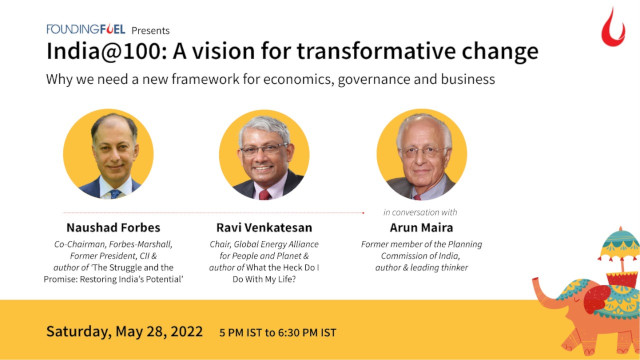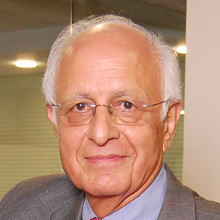[From Unsplash]
Naushad Forbes & Ravi Venkatesan, in conversation with Arun Maira
Saturday, May 28, 2022, 5 PM IST to 6:30 PM IST
India was in crisis, even before a series of global crises hit the world in the last few years. Not a full-blown crisis of condition; but a crisis of aspiration.
Twenty years ago, the late Prof. CK Prahalad, the global management thought leader and author of The Fortune at the Bottom of the Pyramid, led Indian business leaders towards a vision of “India@75”. In 2002, he startled Indian business leaders at an event in New York they had organised to showcase “India Shining” with economic reforms. He said it was not yet the time to celebrate India’s progress. India’s leaders must be honest, he said. India was far from the tryst with destiny it had aspired for in 1947. Rather than celebrate what had been achieved so far, he urged them to envision what India must become by 2022, 75 years from its independence. There were still 20 years ahead then. New thinking was required to bridge the wide gap between what the country had achieved until then and the goals that must be reached by India@75.
An earlier crisis in the condition of the Indian economy had propelled a paradigm shift in economic policies in 1991, which aligned India with the global wave for free markets and free trade, and less government and more private enterprise. These reforms spurred GDP growth, and lifted millions of people above the poverty line. Indian consumers also got access to products they did not have before: phones, automobiles, home appliances, etc. of world-class quality.
In spite of these benefits for Indian consumers (and opportunities for Indian and international businesses), India is far from the “tryst with destiny” it aspired for at its independence in 1947. We had aspired to create a country in which all citizens would have political, social, and economic freedoms. In spite of benefits from the 1991 reforms, millions of citizens continue to suffer from caste and religious oppression, and millions do not earn enough, nor have economic security.
The 20 years since the creation of the India@75 mission have slipped by. The goals have not been achieved.
The Covid pandemic has starkly revealed the structural weakness of the Indian economy: while stock markets grew and the wealth of the already wealthy grew further, hundreds of millions of Indians fell off the edge. India is the world’s most water-stressed large country, and its cities are the world’s most polluted. The only saving grace of the pandemic, if any, was that environmental degradation reduced with the slackening of economic activity. India cannot afford to return to its earlier model of economic growth.
There are moves now to create a vision of India@100. It will not be achieved if we do not change the underlying theories-in-use of economics, governance, and business.
The world needs a new paradigm of progress, and India too.
“We will not just build back…we will build resilient and equitable social and economic systems when the crisis passes.”
So global leaders have declared in each crisis, so far, in this millennium: the global financial crisis of 2008, the Covid pandemic of 2020, and the geopolitical (and economic) crisis caused by the dispute in Ukraine and disputes about Ukraine. The impacts of these sequential crises have been widening from the governance of the financial system and economy to the governance of international relations.
It is not feasible to return to the world that was created before these crises. Nor desirable. The looming global climate crisis has also made clear that we cannot carry on with prevalent models of economic growth and international relations. As Einstein said, “To work harder to solve systemic problems with the same ways of thinking that have created the problems is madness”. We will have to unlearn old ways and learn new ways. “Unlearning” is hard. It requires letting go of “theories-in-use” that have produced results.
Like trapeze artists, we must let go of one swing and turn in mid-air to catch another swing not yet within our grasp. Paradigm shifts are also emotionally hard for powerful people, and thought-leaders, in the present paradigm. They risk losing their status and their power to others.
We must plan the next 25 years to India@100 differently. A change plan is a journey to go from point A to B. Google maps cannot tell you the way to go until it knows where you want to go and where you are. Plans for change must be anchored by a clear vision at one end, and by honesty about our current reality at the other.
Transformative change of economies is always risky. It is like redesigning an aeroplane in which one is flying. It is dangerous to change what is working (albeit not well) for an unknown innovation.
Transformative change is brought about by a “creative tension” within the system, and within the minds of leaders of change. Physical systems do not like tension; nor do human beings. So, we relieve ourselves from the tension necessary for transformative change, either by lowering our goals—to make them more “realistic”, or by pretending that our current reality is not as bad as it is being made out to be. Thus, we reduce the gap and the tension in our minds, of the imagined distance between our aspiration and our reality; and we feel comforted believing that ideas we already know will bridge the gap if we apply them harder.
Ravi Venkatesan and Naushad Forbes are two of India’s most respected business thought-leaders. Founding Fuel has invited them to reflect with us about the journey ahead for India.
Naushad, co-chairman of Forbes-Marshall, was president of CII; and is the chair of the India@75 Foundation. Naushad received his bachelor's, master's and Ph.D. degrees from Stanford University, where he also taught an occasional course for twenty years. He has been close to policy-making in India in recent years and has recently published a book, The Struggle and the Promise: Restoring India’s Potential.
Ravi Venkatesan has been very successful in the worlds of business management, technology and finance. He was chairman of Cummins India, chairman of Microsoft India, chairman of Bank of Baroda, and co-chair of Infosys. He founded the Global Alliance for Mass Entrepreneurship (GAME) to promote the creating of enterprises and livelihoods in the country. He is chair of the board at Global Energy Alliance for People and Planet.
Ravi has recently written a book, What the Heck Do I Do With My Life? In which he discusses challenges of creating impact and of unlearning and learning.
I will engage these thought-leaders in a conversation on a new trajectory for India’s, as well as the world’s progress to build resilient and equitable social and economic systems.



